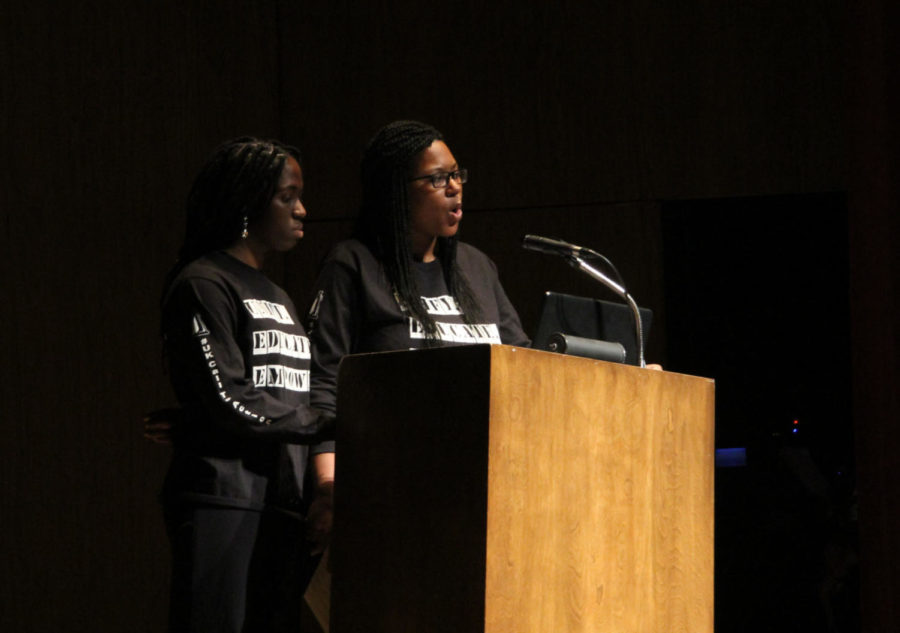Students call for inclusivity, university action on racial issues at town hall
March 1, 2016
President Eli Capilouto was notably absent from the UK Call To Action Town Hall.
The event was a continuation of the racial dialogue that has permeated throughout campus since Capilouto’s meeting with two dozen black students in November.
The conversations about race relations on campus have brought into question the way UK handles harassment cases, the effectiveness of the Office of Institutional Diversity, and the fresco mural inside Memorial Hall.
In the Singletary Center on Monday, the conversation continued, but without Capilouto. UK spokesman Jay Blanton said the president had a long-planned business trip out of the state, but wanted to be at the town hall.
Other administrators, including Terry Allen, director of the Office of Institutional Diversity, and Dean of Students Victor Hazard, were there to report on the university’s progress and to show their plans to better improve inclusivity and diversity on campus.
The town hall began with an emotional bang. Organizers played an audio recording of three UK students talking about an African-American classmate, saying, “I wouldn’t go to Africa if you paid me,” and, “I’m not racist, I just don’t like n******.”
The African-American student contacted UK administrators in 2015, but organizers said the student’s college isolated and separated her, as if she were the problem. They said no one helped her.
“It could have been me,” Eseosa Ighodaro and Erica Littlejohn, students from the Black Graduate and Professional Student Association, said in unison.
More firsthand accounts of discrimination and feelings of exclusion came with the results of a survey conducted by the Black Graduate and Professional Student Association.
The survey focused on black professional and graduate students, many of whom said they did not feel safe or welcome at UK.
“UK only appreciates black students with a ball in the hands. The rest of us are tolerated,” one survey respondent said.
“I was called the n-word on UK campus. I do not feel safe,” another said.
About 44 percent of respondents said they felt they needed to minimize characteristics of their racial or ethnic culture to fit in at UK. Fewer than half said they feel comfortable discussing issues of race, racism and/or racial discrimination with faculty in their college or department.
In a video played during UK Call to Action, black students talked about being the subjects of racial harassment and discrimination by white students.
One said he was stopped and questioned by UK Police as he tried to enter a classroom building, while police let a white student nearby go unquestioned and unbothered.
Organizers of the town hall and subjects in the video talked about their hopes for the university going forward: more unity among all students, more black professors and advisers who stay at UK, a more robust and effectively structured Office of Institutional Diversity, and a mentoring program for minority graduate and professional students, among other things.
They asked UK to take immediate action, and said, “History tends to repeat itself,” referring to race-related protests at the University of Missouri, which led to the resignation of the university system president, Tim Wolfe.
Administrators laid out their plans, and told the audience what efforts are already in the works to improve diversity on campus.
Hazard said funding for certain scholarships aimed at promoting diversity, including the William C. Parker Scholarship and the Lyman T. Johnson Scholarship, have increased substantially in recent years.
Funding for the William C. Parker Scholarship went from $4 million in 2007 to about $15.4 million in 2015-16.
The drop in the state’s financial support for UK will not deter Capilouto’s efforts to continue that trend, Hazard said.
“We must improve,” Allen said about the Office of Institutional Diversity.
Other administrators said they want to boost the number of minority graduate students, and are in the process of reviewing the Student Code of Conduct to more clearly address racial harassment.
UK is also working to create a Bias Incident Response Team, which will focus on reviewing and reporting incidents of harassment.
“We must infuse diversity in everything we do,” Allen said. “We must make progress continuously.”
































































































































































